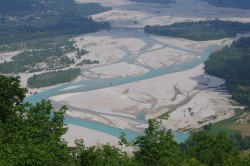Press Release, 30. June 2023
Riverine floodplains and coasts wetlands are indispensable for biodiversity and climate
Discussion paper published / Expert conference planned for September
Inland and coastal wetlands have declined drastically worldwide. This has negative consequences for humans and nature, as the loss releases greenhouse gases and potential areas for adaptation to climate change impacts are lost. A publication by the Federal Agency for Nature Conservation (BfN) with the participation of researchers from the Helmholtz Centre for Environmental Research (UFZ) now sheds light on the role of riverine floodplains and coastal wetlands for biodiversity conservation, as well as climate change mitigation and adaptation in Europe. The topic is also the focus of the fifth European Conference on Biodiversity and Climate Change, which will take place in Bonn on 26 to 28 September 2023.

Photo: Mathias Scholz, UFZ
Between 1970 and 2015, inland and coastal wetlands declined globally by about 35 per cent. This loss releases greenhouse gases that accelerate climate change and results in the loss of land potentially eligible for climate change adaptation. Yet riverine floodplains and coastal wetlands are vital ecosystems for nature and people: they make indispensable contributions to human well-being, biodiversity conservation as well as natural climate change mitigation and adaptation. . They are also considered biodiversity hotspots and provide multiple ecosystem services such as climate regulation, carbon sequestration, flood protection, water filtration, food supply, local recreation and nature tourism. "In order to halt the decline of wetlands in Europe and strengthen their resilience to climate change, there is an urgent need for action," says UFZ floodplain ecologist Dr Mathias Scholz.
A team of researchers from all over Europe has now summarised the current state of knowledge from science, politics and practice in a BfN background paper. It becomes clear that considerable success has already been achieved in the restoration of wetlands, for example in the Camargue in France, in the Ebro Delta in Spain or through the large-scale dyke relocations on the Middle Elbe in Saxony-Anhalt (Lödderitz) or in Brandenburg (Lenzen). However, there are still fundamental challenges. These include competing land use interests, poor implementation and enforcement of legislation, and significant funding gaps. Ute Susanne Kaden, UFZ floodplain ecologist and one of the lead authors of the publication, emphasises: "Of course there are many challenges, but at the same time there are numerous options for action on the table for effective restoration of riverine floodplains and coastal wetlands in Europe." To effectively protect these habitats, a wide range of instruments must be applied, she says. These include policy reforms such as the introduction of the new EU Restoration Law, the use of new land management tools, innovative technologies for planning and control, and better involvement of all stakeholders through social and organisational tools. "Above all, the integration of local people with their local knowledge and experience can play a crucial role in restoring, conserving and sustainably managing wetlands," says lead author Mathias Scholz.
The publication also provides background information and a knowledge base for the European conference "Riverine and coastal wetlands for biodiversity and climate - Linking science, policy and practice", which is being organised by the Federal Agency for Nature Conservation together with the European Network of Nature Conservation Agency Managers (ENCA) in Bonn on 26 to 28 September 2023. The aim of the conference is to to bring together European experts from science, politics and practice, to promote the exchange of knowledge and experience and to jointly develop the topic further. The conference thus also contributes to the implementation of the international convention on wetlands, the Ramsar Convention. Registration for the conference is possible via the conference website.
Publikation:
Kaden, U. S., Scholz, M., , Buijse, A.D., Cvijanovi?, D., Froese, I., Diack, I., Duffield, S., Ibáñez, C., Jähnig, S. J., Januschke, K., Ludewig, K., Marsden, K., Müller, P., Rodríguez-González, P. M., Stadler, J.,Schulz-Zunkel, C., Stammel, B., Wantzen, K.M., Weber, A., Wulf, S., Zak, D. & Bonn, A. (2023): Riverine and coastal wetlands in Europe for biodiversity and climate. State of knowledge, challenges and opportunities. BfN discussion paper DOI: 10.19217/hgr233en
Further information:
More information on the conference: https://www.bfn.de/veranstaltungen/european-conference-riverine-and-coastal-wetlands-biodiversity-and-climate
Conference registration: https://bioclim2023.adelphi.de/
Further information
Dr. Mathias Scholz
UFZ Department of Conservation Biology & Social-Ecological Systems
mathias.scholz@ufz.de
UFZ press office
Susanne Hufe
Phone: +49 341 6025-1630
presse@ufz.de
In the Helmholtz Centre for Environmental Research (UFZ), scientists conduct research into the causes and consequences of far-reaching environmental changes. Their areas of study cover water resources, ecosystems of the future, environmental technologies and biotechnologies, the effects of chemicals in the environment, modelling and social-scientific issues. The UFZ employs more than 1,100 staff at its sites in Leipzig, Halle and Magdeburg. It is funded by the Federal Government, Saxony and Saxony-Anhalt.
www.ufz.deThe Helmholtz Association contributes to solving major challenges facing society, science and the economy with top scientific achievements in six research fields: Energy; Earth and Environment; Health; Key Technologies; Matter; and Aeronautics, Space and Transport. With some 39,000 employees in 19 research centres, the Helmholtz Association is Germany’s largest scientific organisation.
www.helmholtz.de